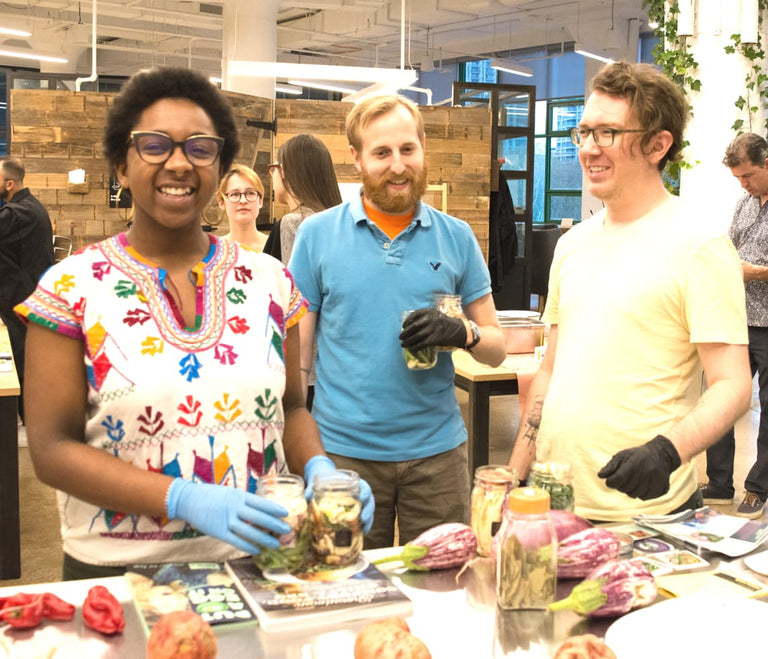How to naturally cope with stress through food and self-care
Given the current state of the world, stress seems to have secured its place as an integral part of our daily lives. Social distancing and other adverse effects of COVID-19 have forced most of us to change our routines and adapt to these new and uncertain circumstances. Life under quarantine has meant less time with friends and more time consuming media to stay up to date on important issues like Blives Matter. Job losses, schedule disruptions, food security issues, and financial panic on top of all this can result in spiked cortisol levels, and therefore, heightened stress. It’s normal to cave to indulgent and unhealthy habits like drinking alcohol, indulging in sweets, and binge-watching shows. While acceptable and even perhaps healthy in small amounts, it’s important that we find a balance in our newly altered lives to manage stress in a healthy way. Below are some of our favorite ways to cope with stress through food and self-care:
Eat a nourishing diet
A nourishing diet can counterbalance the adverse impacts of stress by strengthening the immune system, stabilizing our mood, and reducing blood pressure. Research shows that a, “proper diet can counterbalance the impact of stress by strengthening the immune system, stabilizing moods, and reducing blood pressure.” Complex carbs like spelt berries can induce the brain to increase serotonin production and stabilize your blood pressure. Ever feel dizzy when you stand up abruptly after sitting in front of a screen for a long time? This happens because not enough blood is pumped to the brain, causing low blood pressure. Vitamin C-rich foods like tomatoes and elderberry can boost the immune system and help lower cortisol levels. Magnesium-rich leafy greens and omega-3 fatty acids in fish and nuts are proven to improve sleep quality and help prevent headaches. Even indulging in dark chocolate on the daily has been studied to improve cognitive function and mood.
Eat more adaptogens
Adaptogens refer to plant and fungi-derived substances that adapt to what our body needs and help protect them against stressors. The root and berry of ashwagandha have been revered for centuries in Ayurveda and Traditional Chinese Medicine due to its ability to reduce cortisol levels (stress), anxiety, and fatigue. But herbs aren’t the only way to take advantage of adaptogenic stress-relief. Medical director Dr. Tiffany Lester prefers to eat her adaptogens with meals, finding mushrooms to be her preferred fix. Like ashwagandha, mushrooms are natural adaptogens, and can help to fight free radicals that form when we are stressed. Lion’s mane mushrooms are perhaps best known for their cognitive benefits that include brain health and overall cognition. Both shiitake and maitake are sources for immune health. Can’t get enough of these medicinal delicacies? Check out Local Roots’ Mushrooms Add-On here!
Get that GABA
GABA (Gamma-Aminobutyric acid) is a naturally produced amino-acid that occurs in the brain. It can be both chemically produced and taken as a supplement, aiding in stress-relief and increased relaxation. Herbs like valerian have been praised for their interaction with GABA, promoting sleep and relaxation by reversing low GABA levels. Magnesium, too, increases GABA, which helps regulate the body’s stress-response system. Both valerian and magnesium can be taken by mouth, but magnesium-rich foods make it simple and seamless to incorporate GABA directly into your diet. Produce like apples, carrots, and broccoli are a few of the stand-out sources rich in magnesium, though magnesium can be found in everything from chicken breast to ground beef to milk!
Take a spa… hour?
It’s no new concept to turn to a good old fashioned face mask for stress relief. In fact, there’s a reason it’s such a popular coping device for when we find ourselves stressed out and in need of a break. Taking time (even an hour) for yourself can help you decompress, giving you a chance to step outside your anxiety, even if just for a while. One satisfying way to take care of yourself spa-style is to make an at-home face mask using local and organic ingredients like this one. Featuring raw honey, bentonite clay, and a splash of apple cider vinegar, this mask comes together quickly and easily using ingredients found in most pantries. Not to mention, it doesn’t dry out, nor does it tug and pull at your skin! Other options include cooling cucumber masks for cooling, and squash masks for blemished skin. Just remember: it’s equally as important to use organic, non-sprayed vegetables for your skin as it is for eating.
Unhurried cooking
If you’re as into food as we are, carving out time to make some unhurried recipes can be a cathartic way to reduce stress. Studies have shown that cooking can have a profound impact on stress relief. It engages our senses and can activate fond memories associated with the comfort and warmth of the kitchen. Baking something sweet (like this rutabaga cake) or cooking something low and slow for maximal tenderness (like these lamb shanks) are just a few of the ways that cooking can inspire feelings of solace. For those who don’t feel like getting creative in the kitchen: eating these dishes can be just as rewarding as having made them, trust me.
Stop and smell the essential oils
It may seem like a bunch of scents with nothing to show for, but essential oils do work. These concentrated extracts have been known to promote physical as well as mental well-being. Researchers at Ohio State have found that “when inhaled, the molecules are distributed into the respiratory system,” many of them eliciting an emotional response that can be directly tied to stress-relief. These reactions, according to experts, are subjective, though oils like bergamot do treat stress (not to mention, skin). Most essential oils are inhaled through dilution or used topically, but essential oil diffusers have become popular as well.
Work it out
You’ve heard it all before. Exercise pumps up endorphins; it’s meditative; it improves moods; it reduces stress. But in some cases, especially those in which exercise is not broken up with rest days, stress can increase both mentally and physically. Stress on the body, its muscles and tissues? That’s an obvious one: our bodies need time to rest. But let’s not forget – our brains need a break, too. “Training raises our stress hormone, cortisol. When cortisol is high, your body doesn’t work as efficiently because it believes that you are putting it in a harmful environment,” states Courtney Olsen, a certified personal trainer and nutrition specialist. So with this being said, work it out (but remember to take breaks).
Steep it
When looking for stress-relief in tea, keep in mind that caffeinated teas may not be the way to go. Caffeine is a stimulant, which means that while it can energize us, it can also contribute to spikes in anxiety. Instead of drinking caffeinated teas, turn your attention to herbal teas like chamomile for maximal calming. Chamomile in particular naturally increases serotonin and melatonin levels in your body, leaving you feeling relaxed without feeling drowsy. Not to mention, it’s incredibly easy to get your hands on. Other herbal teas great for relaxation include lemon balm tea, which contains rosmarinic acid (which helps activate GABA) and is used for reducing stress and improving sleep. Plus, the soothing scent can relieve physical muscle stress, too.
Unplug
It may seem obvious to some, and to others it may even seem impossible, but unplugging may be the best jumping off point for reducing stress. This may not be a new suggestion, but have any of us really taken it? The truth is that it’s extremely difficult to take this advice, and most of us don’t even know where to begin. So, as with most things: start small. This can mean 15 minutes of meditation; it can mean journaling; it can mean doing absolutely nothing at all so long as it doesn’t involve email, or anything with Wi-Fi capability. The best way to make your unplugged time stress-free is to plan ahead. If letting your friends and family know you’ll be away from the phone for a bit makes you feel less worried about what messages you’re missing, do it! The important thing is to carve out time for yourself. Being “on” 24/7 isn’t healthy for any of us (physically or mentally). Flip those devices onto Do Not Disturb, and see for yourself the benefits of this simple habit. Your body and mind will thank you for it.
Article by Local Roots NYC Volunteer Jess Santoro (@jess_santoro)
Rather have a taste first?
Local Roots Experiences are fun, pop-up events where we bring the farm to you!

Become a Harvest Club Pick Up Location
Are you a NY based cafe, bar, or neighborhood business? Become a Harvest Club pick up location and have community members come to your establishment each week to pick up their Local Roots harvest.
Top







